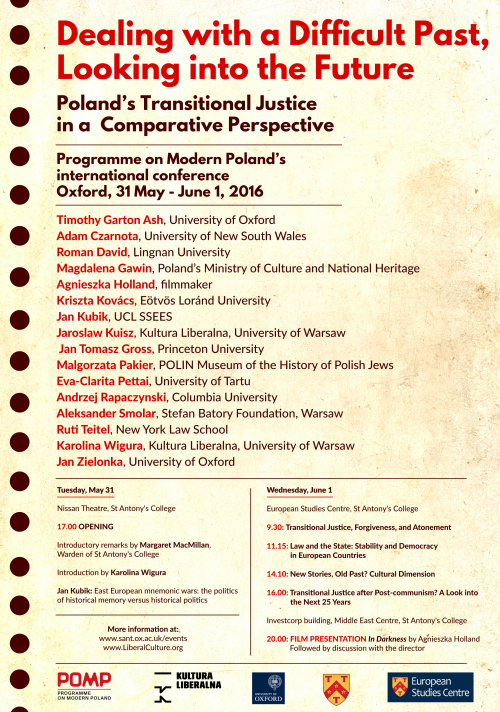Lustration, opening the files, compensation for damages, Nazi and Communist crimes, Jewish-Polish relations, educating the public, atonement, forgiveness, reconciliation, justice. These are just a few notions repeated numerously over the past 27 years in Poland since embarking on a democratic trajectory. While other countries like Germany, Japan and South Africa have struggled to reconcile with difficult pasts, the Polish case proves to be one of the most complicated. Poland’s geopolitical location in the 20th century resulted in a series of atrocities, including the consequences of two totalitarian regimes, two wars, genocide and the fallout from a long,-lasting authoritarian communist regime. Poles were treated as victims, perpetrators, passive observers – all these roles were very often interpenetrating within one single biography.
Has Poland managed to deal with its past? How does the Polish case compare with the experiences of other countries which faced comparable challenges?
Programme for Modern Poland (POMP) at Oxford University and “Kultura Liberalna” (Liberal Culture), founded by the Oxford Noble Foundation warmly invite you to the international conference „Dealing with a Difficult Past, Looking into the Future: Transitional Justice in Poland in a Comparative Perspective”. The panelists include the outstanding Polish and international scholars who are experts in the field of Transitional Justice: Timothy Garton Ash, Adam Czarnota, Roman David, Magdalena Gawin, Jan Tomasz Gross, Kriszta Kovács, Jan Kubik, Jarosław Kuisz, Eva-Clarita Pettai, Aleks Szczerbiak, Ruti Teitel, Karolina Wigura, Jan Zielonka and others.
When: 31 May – 1 June 2016
Where: St. Antony’s College, Oxford University
Streaming online: www.youtube.com/KulturaLiberalna
Portions of the conference will be broadcast online via Kultura Liberalna You Tube channel. Polish recipients will have the opportunity to ask the panellists questions and comment on their speeches on St Antony’s College’s Twitter (@StAntsCollege / #difficultpast).
The conference is co-organised by the European Studies Centre at St. Antony’s College, University of Oxford and “Kultura Liberalna” (Liberal Culture), under the auspices of the Programme for Modern Poland (POMP) founded by the Oxford Noble Foundation
The debate will be held in English.
More information can be found on the event’s Facebook page:
The programme of the conference will be published shortly.
Now, please join the e-debate!
The idea of promoting Polish Studies on world-wide universities – why is it important for Poland?
At the heart of supporting studies about modern Poland on the most prestigious worldwide universities, lays the idea that, today, the economic and political success, as well as a strong position in international relations, depends highly on an international profile. The Polish economy has grown impressively over the last two decades; however, in terms of recognisability, Poland is still disproportionately low. Programme on Modern Poland is a response to the challenge of building a strong position for Poland in international relations. Educational projects, placed at the top world universities, will reach hundreds and thousands outstanding students. These programmes should become a breeding ground for “ambassadors and friends of contemporary Poland”, a place where future leaders and decision-makers from throughout the entire world, specialists in economy and international relations, will get to know Poland as a regional leader and a dynamic economy, and not just from the point of view of its difficult history.
The Programme on Modern Poland on the Oxford University, initiated in 2012, is the first program of studies on contemporary Poland and transformations after 1989 in history offered beyond Poland’s borders. The programme was initiated by the outstanding scholars, including Professor Norman Davies and Professor Timothy Garton Ash. The programme honorary patrons include former Prime Minister Tadeusz Mazowiecki (1927-2013) the father of the success of the Polish transformations, and Professor Zbigniew Pelczynski – one of the most accomplished Poles at Oxford and a social activist, who has been supporting Polish students over the last 15 years. Dr Leszek Czarnecki founded the Programme on Modern Poland through Noble Bank and the Oxford Noble Foundation.





